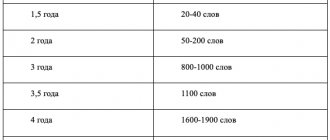The fact that the language's dictionary contains approximately 300 thousand words is only of theoretical interest for a beginner learning this language. Perhaps the main principle for the reasonable organization of your studies, especially at the initial stage, is the economy of words. You need to learn to memorize as few words as possible, but do it as best as possible.
Let us emphasize that our approach is directly opposite to the guiding principle of “suggestopedia”, with its emphasis on the abundance of words presented to the student. As you know, in accordance with its canons, a beginner needs to be literally “showered with words.” It is best to give him or her 200 new words every day.
Is there any doubt that any normal person will forget all those numerous words with which he was “showered” using this, so to speak, method - and most likely very soon, in just a few days.
Don't chase too much
It will be much better if at the end of a certain stage of study you know 500 or 1000 words very well than 3000 - but poorly. Don’t let yourself be led into a dead end by teachers who will assure you that you need to first learn a certain number of words in order to “get into the swing of things.” Only you yourself can and must decide whether the vocabulary you have mastered is sufficient for your goals and interests.
Language learning experience shows that about 400 well-chosen words can cover up to 90 percent of the vocabulary you need for everyday communication purposes. In order to read, you will need more words, but many of them are only passive. Therefore, with knowledge of 1500 words, you can already understand fairly meaningful texts.
It is better to master the words that are most necessary and important to you than to constantly rush to learn new ones. “He who pursues too much risks missing everything,” says a Swedish proverb. “If you chase two hares, you won’t catch either,” says a Russian proverb.
What's more important
Both dictionaries are extremely important for effective communication, since the active dictionary allows you to correctly express your thoughts, and the passive one allows you to understand the statements of other people without much difficulty, develop a semantic guess, even when communicating on completely new, unfamiliar topics.
However, it is always worth maintaining a natural balance. That is, to work efficiently both in receiving and delivering information. You may perfectly understand everything that is said to you, but it will be very difficult to say anything. This situation will arise if you do not pay enough attention to speaking practice.
Either way, there is no point in deliberately developing any particular skill. When learning new vocabulary, words will sort themselves. Some will seem interesting to you, some will be useful, and some you will simply put aside as unnecessary in the passive stock of the English language.
Read also
English based on the cartoon Shrek
Vocabulary in oral speech
Very roughly speaking, about 40 well-chosen, high-frequency words will cover about 50% of word usage in everyday speech in any language;
- 200 words will cover about 80%;
- 300 words - approximately 85%;
- 400 words will cover about 90%;
- Well, 800-1000 words are about 95% of what would need to be said or heard in the most ordinary situation.
Thus, the right vocabulary helps you understand quite a lot with very little effort spent on cramming.
Example: if a total of 1000 words are spoken in an everyday conversation, then 500 of them, that is, 50%, will be covered by the 40 most common high-frequency words.
We emphasize that these percentages, of course, are not the result of exact calculations. They simply give the most general idea of how many words it will take to feel confident when entering into a simple dialogue with a native speaker. In any case, there is no doubt that by correctly choosing from 400 to 800 words and remembering them well, you can feel confident in a simple conversation, since they will cover almost 100% of those words that you cannot do without. Of course, under other, less favorable conditions, 400 words will cover only 80% of what you need to know - instead of 90 or 100%.
How to help your child develop a good vocabulary?
In order for your child’s vocabulary to develop correctly, you need to constantly communicate with him. The extent to which this communication is complete is shown by the volume and quality of the preschooler’s vocabulary. Therefore, it is recommended to regularly introduce the child to new objects and phenomena, name them, explain the features and characteristics of each. It is also important to pay attention to conversations with the child, ask him questions, create situations in which it is possible to identify shortcomings in the child’s understanding and use of words. The more active the family’s lifestyle, the more favorable conditions are created for expanding the child’s vocabulary. This is not only traveling to other cities and countries, you can go to the theater, circus, or zoo. Thus, the regularly replenished vocabulary is systematized, ordered, and put into semantic fields.
Reading vocabulary
When reading, having correctly chosen and well remembered about 80 of the most common, most frequent words, you will understand about 50% of a simple text;
- 200 words will cover approximately 60%;
- 300 words - 65%;
- 400 words – 70%;
- 800 words - approximately 80%;
- 1500 - 2000 words - about 90%;
- 3000 — 4000 — 95%;
- and 8,000 words will cover almost 99 percent of the written text.
Example: if you have a text in front of you with a volume of approximately 10 thousand words (this is approximately 40 printed pages), then, having learned the most necessary 400 words in advance, you will understand about 7000 words that are used in this text.
Let us note again that the figures we give are only indicative. Depending on various additional conditions, 50 words will cover up to 50 percent of the written text, but in other cases you will need to learn at least 150 words to get the same result.
Individual dictionary
Any language is extremely diverse, and knowing a language does not mean knowing all its words and expressions . This is simply impossible, because even in your native language, sometimes you are amazed at how much is still unknown, and this is not to mention specific names and terms relating to certain professions, names of birds, flowers, medical terms, and so on.
To know a language means to have a certain vocabulary sufficient for communication in different situations. This is a purely individual thing, which depends on the needs of each individual person, but also, of course, on different levels.
You can know a few words, but use them masterfully and create complex lexical structures. And even with a huge vocabulary, you may not be able to convey your thoughts. If we talk about dry quantities, here are the approximate requirements for how many words a person should know at a certain level of English proficiency:
- Starter – 500–600 words
- Elementary – 1000–1300 words
- Pre-Intermediate – 1400–1800 words
- Intermediate – 2000–2500 words
- Upper-Intermediate – 3000–4000 words
- Advanced – 4000–7000 words
- Proficiency – 7000–12000 words
And one more interesting point. Ten thousand words is not twice as good as five thousand. And two thousand is not twice as good as one. After all, words are not equal in value. Some are used more often, while others less often. After learning a few thousand words, you will already understand up to 80% of what is written in English texts. And beyond 10 thousand words, each word still expands your vocabulary, but not as much as words in the first thousand. We wrote more about this in the article 1000 most important English words .
Vocabulary: from 400 to 100,000 words
- 400 - 500 words - active vocabulary for language proficiency at a basic (threshold) level.
- 800 - 1000 words - active vocabulary in order to explain yourself; or passive reading vocabulary at a basic level.
- 1500 - 2000 words - active vocabulary, which is quite enough to ensure everyday communication throughout the day; or passive vocabulary sufficient for confident reading.
- 3000 - 4000 words - in general, enough for almost fluent reading of newspapers or literature in the specialty.
- About 8,000 words - provides full communication for the average European. There is practically no need to know more words in order to communicate freely both orally and in writing, as well as read literature of any kind.
- 10,000-20,000 words is the active vocabulary of an educated European (in their native language).
- 50,000-100,000 words - the passive vocabulary of an educated European (in their native language).
It should be noted that vocabulary alone does not ensure free communication. At the same time, having mastered 1,500 correctly chosen words, with some additional training, you will be able to communicate almost freely.
As for professional terms, they usually do not present any particular difficulties, since in most cases this is an international vocabulary that is quite easy to master.
When you already know about 1500 words, you can start reading at a fairly decent level. With passive knowledge of 3,000 to 4,000 words, you will be fluent in reading literature in your specialty, at least in those areas where you are confident. In conclusion, we note that, according to calculations carried out by linguists based on a number of languages, the average educated European actively uses about 20,000 words (and half of them are quite rare). In this case, the passive vocabulary is at least 50,000 words. But all this concerns the native language.
What is the difference
Passive vocabulary includes those words that you learn in the process of working with words, understand them, but cannot yet use in your daily speech. For example, you can find frequent use of the word “talk” in the active dictionary. The word “chat” is in the passive, but it is rarely used.
Or it can be explained using the example of the Russian language. It should be clearer this way. Take, for example, the word “traffic light”. You know this word and can easily use it where appropriate. But take, for example, the words “kaleidoscope” or “conceptual”. You know the meaning of these words, recognize them in the text and, if desired, will be able to explain their meaning to another person. But in your everyday speech you either don’t use them or use them very rarely.
This phenomenon is observed not only in English, but in other languages too. There are rarely used (passive) words and frequently used (active) words. Words can go from active to passive if you don't use them, and vice versa - from passive to active if you start using it quite often.
vocabulary also depends on the level of knowledge of each student . The more words he has, the better and more varied his speech will be. Let's talk in more detail about the individual dictionary.
Read also
TOP 10 applications for learning English (video)
Age norms for the number of words used
The number of words used varies throughout life. According to medical standards, the number of words used by a preschool child should be from two to three thousand. Over the years of schooling, the active dictionary is replenished to five thousand.
For people who have received higher education, the norm is a vocabulary of up to ten thousand words.
A group of scientists from America and Brazil conducted a study of age-related changes in vocabulary. Two hundred thousand people took part in the experiment, so the data obtained during it can be considered quite accurate.
The survey showed that the maximum rate of learning new words occurs between the ages of three and sixteen years. During this period, a person learns an average of 4 new words every day.
After sixteen years, the speed decreases noticeably and, up to fifty years, there is about one new word for every day of life. People over fifty years old retain their previously acquired vocabulary, but practically no new ones are added.
Number of words in the lexicon
It should be noted, returning to the question of what a lexicon is, that each person’s active and passive dictionaries are individual. It depends on the age, profession, general cultural level, personal qualities, tastes and even the place of residence of the person. According to statistics, the active vocabulary of an adult with higher education is seven to nine thousand words. Passive - twenty to twenty-four thousand. Although in everyday communication we get by with only one or two thousand words. They say that the possibilities of human memory are almost limitless. Therefore, you can safely increase your vocabulary and learn foreign words, thereby enriching the Russian vocabulary.
It is believed that at the dawn of human existence, speech was not much richer than that of some animals. If, for example, a chicken’s “language” has 10 simple signals, a baboon’s “language” has 18, then a primitive man, like a chimpanzee, had a “vocabulary” that barely exceeded 30 signals—cries.
As society developed, human speech was constantly enriched with new words. The Dictionary of the Modern Russian Language, published in 1956-1965 by the Academy of Sciences, contains 120,480 words in 17 volumes.
How quickly do children learn speech? If a child at the age of one year knows only three words, then six months later his vocabulary increases to 26-28 words. At four years old he already knows about 1000 words, and at six and a half years old he pronounces an average of 2 thousand words and understands the meaning of another 6 thousand.
Scientists have conducted research and calculated that in the works of the ancient Roman poet Horace there are 6084 different words; the English poet Milton has approximately 8 thousand words; in Homer's poems - about 9 thousand words; in the works of Shakespeare - 15 thousand words (according to other sources - up to 24 thousand words), in the works of Pushkin - 21 thousand words.
It is interesting to compare the number of words used by ordinary people with the dictionaries of great writers. According to psychologists, a 14-year-old teenager uses 9 thousand words, the average adult uses 11,700 words, and an educated person uses up to 13,500 words.
I wonder how many words a person says every day? It depends on temperament, profession and other conditions. Scientists still established an average figure: 30 thousand words. At the same time, a person speaks on average at a speed of 125-160 words per minute, and thinks in the same words twice as fast.
According to research, the recognized “talkers” are the French. Their average speech speed is 350 syllables per minute. The Japanese are behind them - 310 syllables and the Germans are not far behind - 250 syllables. Polynesia and Melanesia - an average of 50 syllables per minute.
The Finns are the most silent nation in the world. Canadians follow. The most talkative and loud are the Italians, Brazilians and Mexicans.
Is it useful to talk? Useful - this is what American Professor Williams says. People who don’t talk much are susceptible to various kinds of stress, as they do not give an outlet to the energy that has accumulated in them. As a result, they age prematurely.
And one more interesting data. Experts have calculated that each person speaks on average one hour a day. Over the course of a lifetime, this is approximately 2.5 years. If everything said by a person during his life is recorded on paper, the result will be a thousand volumes of 400 pages each.
For a long time, many people have thought that women speak more than men. But recently, scientists have tested and refuted this opinion, finding that, in general, both men and women pronounce the same number of words, which means they are equally talkative.
The Russian language is distinguished by its richness of vocabulary. Dahl's dictionary contains about two hundred thousand lexical units. Much fewer words are used in everyday life.
What is a lexicon?
From ancient Greek it means “word”, “figure of speech”. The exact lexicon sounds like this: a combination of words of a particular language, parts of words or language that a specific person or a specific group of people speaks. Vocabulary is the central part of the language, which names, forms and conveys knowledge about any phenomena or objects. In other words, this is a language section that studies words, pronunciation, composition of speech, etc.







